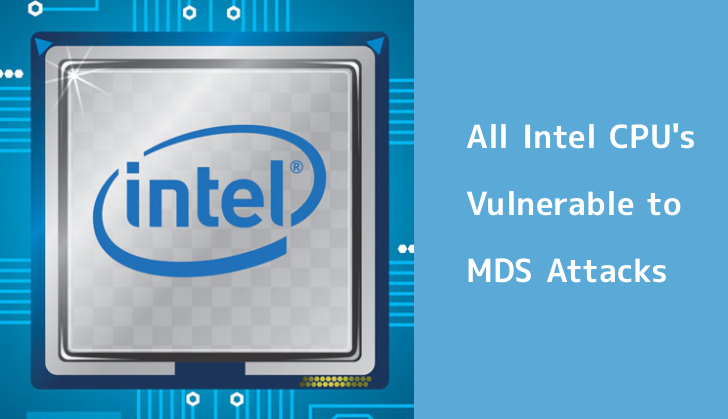MDS Attacks – All Intel CPU’s Vulnerable to New RIDL and Fallout Attacks

Security researchers discovered a new wave of hardware-based critical side-channel vulnerabilities in Intel CPUs also called as MDS Attacks affected Tens of Millions of Modern Intel CPU ‘s in wide.
The combined of RIDL and Fallout speculative execution attacks in Intel CPU’s let attackers leak confidential data from the vulnerable systems.
Confidential data can be leaked across arbitrary security boundaries by Exploiting this Microarchitectural Data Sampling (or MDS), a combined Side channel vulnerabilities in real-world settings such as cloud and browsers.
MDS Attacks worse than recently uncovered such as Spectre, Meltdown, and Foreshadow which was intended to leaking data from the CPU caches.
But RIDL and Fallout collect data from internal CPU buffers and the method of exploiting this vulnerability named as “Microarchitectural Data Sampling” (MDS) by Intel.

MDS attacks mainly targeting CPU-internal buffers such as Line Fill Buffers, Load Ports, Store Buffers and leak arbitrary in-flight data.
Multiple teams of researchers have been disclosed this MDS attacks which combined of 3 side-channel attacks and ZombieLoad exploit.
One of the side channel vulnerability called RIDL allows attackers to MDS vulnerabilities to mount practical attacks and leak sensitive data from different internal CPU buffers.
Here the researchers demonstrated the leaking the root password hash from an unprivileged user, sensitive data from the Linux OS kernel, and JavaScript.
Another Side channel attack called Fallout allows attackers can leak data from Store Buffers, which are used every time a CPU pipeline needs to store any data.
It allow an unprivileged attacker can then later pick which data they leak from the CPU’s Store Buffer.
The ZombieLoad attack allows stealing sensitive data and keys while the computer accesses them.
According to the research, “While programs normally only see their own data, a malicious program can exploit the fill buffers to get hold of secrets currently processed by other running programs. These secrets can be user-level secrets, such as browser history, website content, user keys, and passwords, or system-level secrets, such as disk encryption keys.”
Researchers also developed a dedicated MDS tool for Windows, Linux to verify whether your system is vulnerable.
Following CVEs assigned for MSD vulnerabilities,
CVE-2018-12126: Microarchitectural Store Buffer Data Sampling (MSBDS)
CVE-2018-12127: Microarchitectural Load Port Data Sampling (MLPDS)
CVE-2018-12130: Microarchitectural Fill Buffer Data Sampling (MFBDS)
CVE-2019-11091: Microarchitectural Data Sampling Uncacheable Memory
You can also Download Free E-book to learn about complete Enterprise Security Implementation & Attack Mitigation Steps – Download Free-Ebook Here.








Gloss